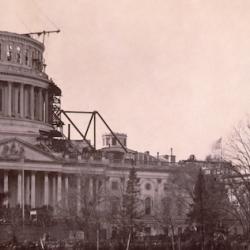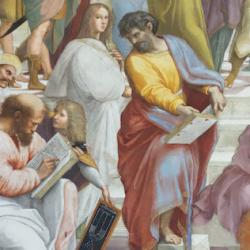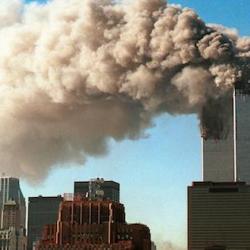Stewart Alsop begins his book on Washington, DC, The Center, by observing that DC wasn’t always the center: “during the long prewar political doldrums, the era of the doughface Presidents, it was no true center of power. Nor was it in the decades between Abraham Lincoln and Theodore Roosevelt. The Washington Henry Adams knew, in that era of the robber barons and the conquest of the West, was a sideshow.” Theodore Roosevelt and Woodrow Wilson “accelerated the process,” but it wasn’t until the 1920s and 30s that “Washington again became, this time for good, the true center of American power.”
Alsop thinks this is one of the reasons for “the almost lunatic hatred which the rich and respectable, above all in the Wall Street financial community, felt for Franklin Roosevelt.” It wasn’t that the New Deal impoverishes the wealthy. They got richer. The issue was power: “power as well as money was at stake, and, more even than the loss of money, men instinctively resent, and bitterly resist, the loss of power.” Because it became the undisputed, permanent center of political power, it got to call the shots on economics and finance and everything else.
Becoming the center of power has meant becoming the center of attention, the center of drama: “Washington’s drama is, curiously, a recent discovery for the rest of the country. Until recently, for example, the Washington novel, aside from such exotica as Henry Adams’ Democracy and bits of Edith Wharton, hardly existed. Then Allen Drury wrote his Advise and Consent. Since then the bookstores have been flooded with Washington novels, in which generals unleash nuclear war, Senators commit sodomy, Presidents go mad, and beautiful hostesses leap relentlessly in and out of the beds of Very Important Persons.”
This isn’t where the real drama of Washington takes place. Rather, Alsop locates the drama in ceremony and in conflict. DC ritual “can be unforgettable. A Presidential Inauguration is always moving, for it symbolizes the legitimate assumption of great power—and the transfer of power without risk of bloodshed is in itself a great, and historically novel, accomplishment. The Inauguration of John F. Kennedy was peculiarly moving, in part because it also symbolized the transfer of power from one generation to another.”
The more regular form of DC drama is conflict: “When conflict concerns vital national issues, as in the case of Jefferson and Hamilton, the drama takes on grandeur. And although Washington has always had its share of squabbles based on personal ambition and petty rivalry, the basic conflict almost always revolves around issues of genuine importance—sometimes, of life-and-death importance. In today’s Washington, for example, it is around such issues that the conflict between Lyndon Johnson and Robert Kennedy, as dramatic in its way as any conflict in Washington’s history, revolves.”
Alsop admits up front that he likes Washington, because he likes politics and the drama of conflict that surrounds it. Whether or not DC’s assumption of the center was healthy for our political life is another matter.















